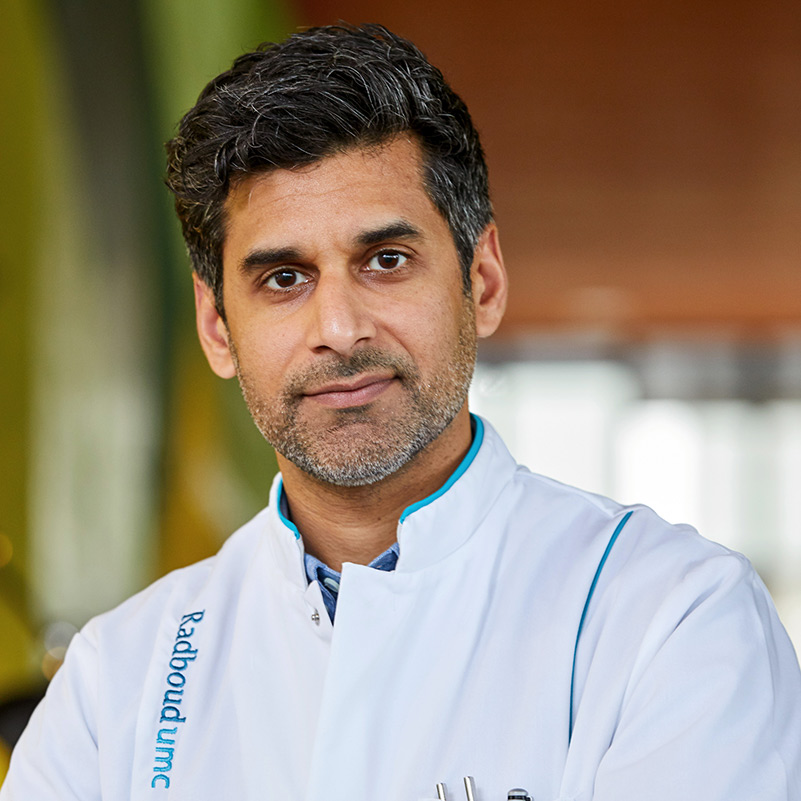Treating Physician
Why apply Whole Genome Sequencing (WGS) to DNA testing in the care of cancer patients?
What do you know after the comprehensive DNA test?
The comprehensive DNA test is used to reveal the complete DNA of the tumor. This involves a single, validated diagnostic test (OncoAct) using only one freshly frozen tissue sample and a blood control sample as input.
We identify four types of abnormalities: mutations, amplifications, fusions and loss of genes.
In addition to the standard abnormalities, the test can provide information about the presence of specific molecular profiles such as homologous recombination deficiency and microsatellite instability, as well as reveal the total number of tumor mutations.
We only report back abnormalities (mutations/biomarkers) that are potentially actionable and may be relevant for treatment decisions.
Watch the short video we have created for physicians and pathologists.
Why use WGS for DNA Testing in the Care of Patients with Cancer?
The treatment of cancer is increasingly based on molecular characteristics of the tumor, which are different for each patient. In order to determine which medication best suits the patient, it is essential to know which mutations can be found in the DNA of the tumor. Once the entire DNA sequence of the tumor has been examined, all the biomarkers found can be used to assess whether there is any medication available for treating this specific tumor (targeted medication).
Personalized Treatment
With the growing number of targeted medications available, it is becoming increasingly possible to provide personalized treatment. Treatment is then based on all the individual characteristics of the patient’s tumor. This work method increases the chance that the patient gets the right medication. It reduces the risk of over treatment with ineffective drugs and prevents the associated unpleasant side effects. “Personalized” treatment may simply be standard treatment.
Taking the Biopsy Sample
In order to be able to conduct this DNA test properly, high standards are set for the collection of tumor tissue and blood as well as for how they are transported. The biopsy sample should be frozen as soon as possible and not set. The instructions for the hospital are included in the Sample Registration form.
Biomarker Detection
Not only the number, but also the complexity of biomarkers has increased significantly in recent years. In order to always report the latest insights without having to set up new DNA tests, we use whole genome sequencing. It can detect any possible DNA-based biomarkers. This technique requires not only the DNA of the tumor, but also the “normal” DNA of the patient in order to see which DNA changes determine the origin of the tumor. In addition to the tumor tissue, blood must also be taken.
Different DNA tests are performed in the current diagnostics. These look at a limited part of the DNA. OncoAct is the most extensive DNA test available for tumor analysis. OncoAct includes all other DNA tests, regardless of tumor type.
Here are just some of the properties that OncoAct can determine:
- mutations in oncogenes, including activation of kinases
- bRAF mutations in skin and lung cancer
- ALK, ROS1, RET, fusion genes in lung cancer
- EGFR mutations and exon skipping in lung cancer
- EGFR resistance mutations in lung cancer
- MET amplification and exon 14 splice mutations in lung cancer
- HER2 mutations in breast and lung cancer
- RAS status in colon cancer
- NTRK1, 2, 3 fusions
- microsatellite instability (MSI)
- tumor mutational burden (TMB)
- BRCA1/2 mutations in ovarian and breast cancer
- homologous recombination deficiency (HRD, “BRCAness”) in ovarian and breast cancer
- HER2 amplification and PIK3CA status in breast cancer
- PDGFRA and cKIT mutations in gastrointestinal stroma tumors (GIST), etc.
- IDH1 and IDH2 mutations and EGFRvIII status in brain tumors
- detection of fusion genes in soft tissue tumors
- all founder mutations for clonality studies (e.g. TP53, APC).
The OncoAct patient report is updated immediately when new biomarkers become available that may be relevant to a treatment choice. The advantage of whole genome sequencing is that you do not have to modify or validate the DNA test itself. Adjusting the software will suffice. This means that the DNA test is always up to date with the most recent insights. The patient report also refers to experimental treatments that are available and to “off-label” options in the DRUP study.
In addition to DNA diagnostics, other test results are also important. These tests are performed by the pathology, clinical chemistry, and radiology departments of the hospital. Other patient characteristics may also play a role.

“Every patient with metastatic cancer should be given the opportunity to get the whole tumor genome examined once for the best chance of a working treatment.”
Hartwig Medical OncoAct®
OncoAct
OncoAct, Hartwig Medical Foundation’s most comprehensive molecular diagnostic DNA test, is suitable for all adult patients with cancer who have tumor tissue that can safely be collected. OncoAct is suitable for all types of cancer, except leukemia.
Current Molecular Diagnostic DNA Tests
In the current care of patients with cancer, hospitals already conduct various molecular diagnostic DNA tests. These DNA tests focus on a limited number of DNA characteristics of the tumor. They are therefore suitable for a limited number of types of cancer.
Off-Label Treatment Options
OncoAct can, in certain cases, identify additional experimental or “off-label” (medication registered for a different type of tumor) treatment options.
The following patients can benefit most from the complete DNA test:
- patients who no longer have any treatment options available based on regular diagnostics
- patients with a rare tumor (approximately 23,000 patients in the Netherlands) who have no standard treatment available to them.
The treating physician and patient decide together whether OncoAct should be requested.

“You want to start the most effective therapy as early as possible for some aggressive types of cancer, and sometimes this can be done by understanding the molecular background of that particular patient’s cancer.”